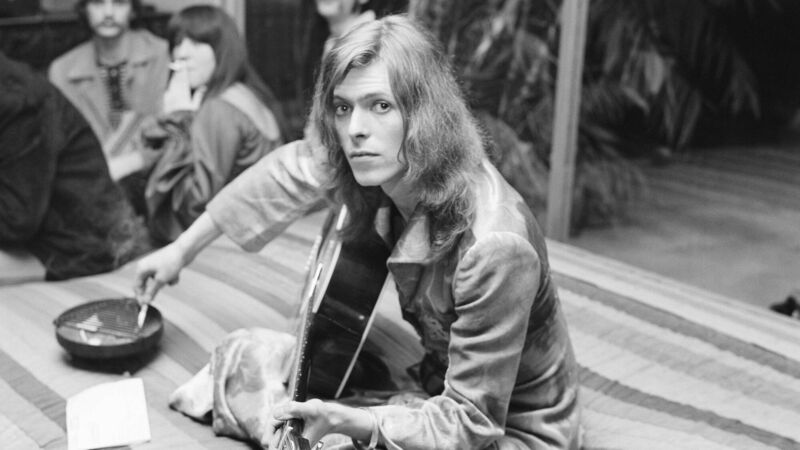Suzanne Harrington: David Bowie died five years ago - culturally, we are all his widows

A pre-glam David Bowie jams at a party thrown by publicist and future nightclub impresario and DJ Rodney Bingenheimer at lawyer Paul Figen's house in January 1971, in Los Angeles, California. (Photo by Earl Leaf/Michael Ochs Archives/Getty Images)
Five years ago yesterday morning – a grey, grimly cold day - I was standing in the kitchen, staring in disbelief at the words coming out of the radio. Water spontaneously leaking out of my eyes, spilling onto the countertop. David Bowie had left.
I have never - before or since - wept at the death of someone I don’t know. I mean, why would you? But that January morning, I couldn’t stop. I felt like Alice, drowning in her own tears, finally experiencing a glimmer of understanding for all those mad people who had cried over Princess Diana. Except it wasn’t out of sentimentality or a sense of tragedy or a misplaced release of repressed emotion, the way men cry at the football but not at funerals: it felt bigger than that.
It felt like the loss of a force of art manifesting as music that had stretched across my whole life, an arc that had reached out through vinyl and cathode since that first time on Top of the Pops in August 1980. The video of a chalk-white apparition in a scrappy Pierrot costume, flanked by what looked like members of the Greek Orthodox church, being followed up a beach by a bulldozer. Sandwiched between stuff like Abba and Sheena Easton. My 13-year-old eyes blinded, mind blown. Who was THAT?
GQ editor Dylan Jones had a similar experience age 12 in 1972, when Bowie did Starman on Top of the Pops – he wrote an entire book, When Ziggy Played Guitar, about that pivotal four minute performance when a red haired freak from outer space with a blue guitar was beamed into unsuspecting suburban living rooms. Still in kindergarten, I missed it.
It took some time to join the Bowie dots. When a friend snuck me her big sister’s old copy of Hunky Dory, I had no idea, as I wore the vinyl thin on the record player in my room, what a bibbity boppity hat might be, why there were mice everywhere from Ibiza to the Norfolk Broads, or that this singer was the same being in the Pierrot outfit. That Ziggy was a made-up character, who was different from the one with the red and blue lightning bolt on his face. That there had been another one, even earlier, curly-haired, in a dress. And a thin pale one who did America soul. I had no idea that these people were all Bowie.
Three years after that seminal Pierrot moment, a tanned guy in a flash suit appeared, suggesting that we dance. Put on your red shoes and dance the blues. Him again. Years later, heavily pregnant, I saw him at Glastonbury. Played Kooks at my child’s naming party. At the press day of his 2013 V&A retrospective, stood rooted in front of a giant screen of him, surrounded by equally dumbstruck members of the press. He held us all in thrall. His wife Iman says she will never marry again. Culturally, we all are his widows.


